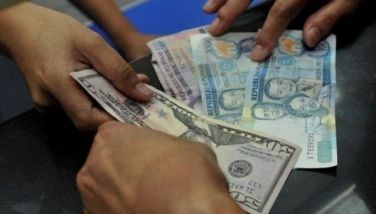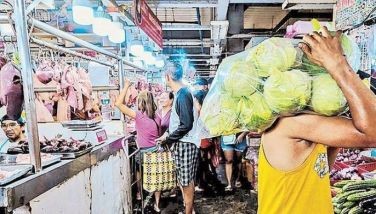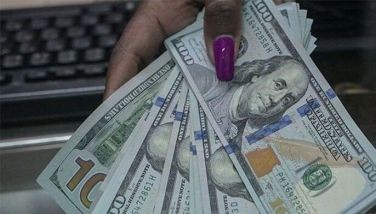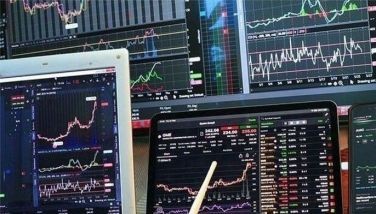Unraveled

When the unraveling of our country’s financial position in 1983 turned desperate, then prime minister Cesar Virata gathered the courage to talk to Marcos. He knew he simply had to tell him what was burning up inside him for so long. Here is how Virata’s biography, as written by Gerardo Sicat, related it:
“He told Marcos that the only way to prevent any default was for the President to seek the assistance of ‘his friends’ who had dollar resources that could bail the country out of its crisis. It was a short term measure that could help buy time… Virata did not have to name names, but it was clear that Marcos understood who he needed to contact…
“Soon after Virata’s consultation with the President, the Central Bank received a sizable remittance of $125 million, which provided temporary relief for the worsening balance of payments.”
But after the discovery of the overstated forex reserves, the international banks found one more reason not to trust the Marcos government. It made getting new loans or even getting debt relief more difficult.
The Sicat book noted that: “Publicly the matter was quite damaging. The integrity of the balance of payments was at stake…”
Virata “accepted that the problem of trust and credibility had interrupted the flow of discussion on the balance of payments,” his biography relates.
What was the problem about? The Virata biography recalls:
“... the data on the country’s foreign reserves in full documentation was found wanting… one item among the reserve accounts was not responded to by the contracting bank… The matter involved the amount of $600 million that PNB Singapore borrowed from a bank in London. Without the latter’s confirmation, there was no real asset to speak of. So, if it was unconfirmed, the amount recorded could not be deemed part of the country’s reserve accounts.”
But let it be clear that the economy and the country’s finances started to deteriorate long before 1983 because Marcos allowed his cronies to abuse their privileges. Our over dependence on international borrowing that was wasted on behest loans to political cronies made a crisis inevitable.
UP economist Dr. Noel de Dios explained in a blog what happened.
“The reason for the dismal performance under martial law is well understood. The economy suffered its worst post-war recession under the Marcos regime because of the huge debt hole it had dug, from which it could not get out.
“In fact, all of the ‘good times’ the admirers of the regime fondly remember were built on a flimsy sand-mountain of debt that began to erode from around 1982, collapsing completely in 1984-1985 when the country could no longer pay its obligations, precipitating a debt crisis, loss of livelihood, extreme poverty, and ushering in two lost decades of development.”
It was the era of the petrodollar. The rich oil countries were depositing their excess hoard of dollars in international banks. The banks, in turn, were eager to lend those petrodollars. But they mostly lent to government institutions with sovereign guarantees.
So PNB and DBP borrowed those petrodollars and lent them to the Marcos cronies. When the cronies were unable or unwilling to pay back their loans, the GFIs took the losses in their books. But because the loans were guaranteed by the Republic of the Philippines, payment to the international banks were still required.
Those were difficult times. Interest rates were rising, making the cost of servicing those bad loans more expensive for the government.
The prices of our principal exports of sugar and coconut oil were down, reducing potential dollar earnings for the country. The prices of imported crude oil and petroleum products were rapidly increasing and that required more dollars to flow out.
Capital flight was also soaring, specially after Ninoy Aquino was killed. The political risk made banks shun us even more. In October 1983, Jaime Laya reported a $700 million credit line pretermination, the Sicat book reports.
So, our economic managers knew things were about to blow up. That’s why Virata was in New York with Laya and Cesar Buenaventura in October 1983. That’s when David Flagg of Manufacturers Hanover Bank, the bank managing our account, met with them and told them about the $600 million overstatement.
The Sicat book said “Virata was aware that capital flight had been instigated not only by normal forces within the country, but also as a result of the political malady that gripped the nation. This was a factor he could not directly influence, but which he felt Marcos had better control of.”
Virata, the Sicat book said, “was aware that large trading profits were earned during the heyday of the sugar boom late in the 1970s, and he was aware of the huge losses suffered when the international price for sugar collapsed. To the same extent, that was true of coconut products…
“Virata suspected that part of the net outflows of dollars was related to these major export commodities. Over the years, the problems connected with the trading practices involving sugar and coconut products, as well as forestry products, must have led to an accumulation of salted dollars in safe havens abroad.”
Putting everything in easier to understand terms, our financial crisis had been powered by the greed of the Marcos cronies. They salted dollars by not remitting all the proceeds of their export sales and also by overpricing the import cost of their capital equipment. A good example of bloated cost is the nuclear plant.
The economic managers like Virata could not do anything because the cronies golfed with Marcos and reported directly to the President. PNB did not report to Virata, but to a major crony.
It is not likely that Marcos didn’t know what his cronies were doing. It could well be that Marcos shared some of those proceeds, which explains how he accumulated all those offshore dollar accounts too.
All the shenanigans through the years brought us to the crisis in 1983. The overstatement was just the final dramatic event. Surely we do not want a repeat, or do we? We seem to be suckers for punishment.
Boo Chanco’s email address is [email protected]. Follow him on Twitter @boochanco
- Latest
- Trending


























